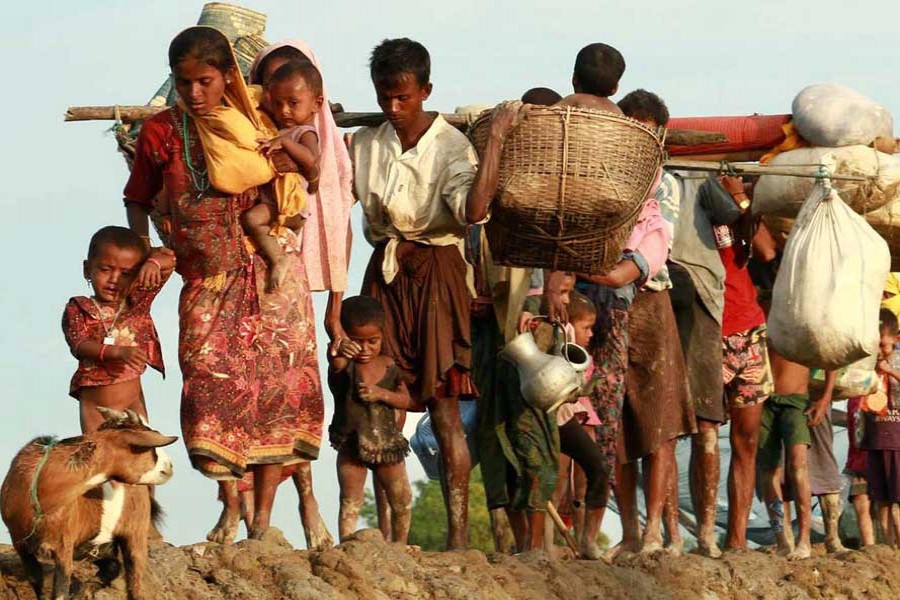
Published :
Updated :

The government made prompt and sustained efforts to keep the world community informed about the grim situation arising out continuing exodus of more than half a million of Rohingya Muslims into Bangladesh, fleeing ruthless atrocities, terror and scotched-earth campaign unleashed by Myanmar army. This has bore fruit and Rohingya crisis has now been fully internationalised. The international community is forthcoming in outright denunciation of brutal and callous treatment by Myanmar authorities towards is own citizens and calling for an immediate safe return of Rohingyas to their homes in Myanmar.
At a time when there is a surfeit of refugee crises because of conflicts in Syria, Iraq, Libya, Afghanistan and South Sudan, and also when the world is worried about donor fatigue, it was not an easy task to draw world attention to the Rohingya crisis.
The visit by Prime Minister Hasina to the Rohingya refugee shelters was a humanitarian gesture which at once registered attention and sympathy of the international community. Nine US senators wrote to the Prime Minister praising her about her generosity to provide shelter to the fleeing Rohingyas. Her five-point proposal for resolving the crisis, including implementation of Kofi Annan Commission Report, in her UN General Assembly speech drew wide appreciation of the international community.
Our foreign office rose to the occasion and has displayed remarkable professional skill, aplomb, finesse and deftness in handling the situation. Faced with unwarranted provocations of Myanmar army deployment and repeated over-flights of military helicopters along the border, Bangladesh has maintained calm and restraint.
The foreign office has arranged frequent briefing of Ambassadors about the severity of the crisis and arranged their visit to Rohingya refugee shelters in Cox's Bazar. On the eve of open UN Security Council meeting, it briefed Ambassadors of Security Council member countries.
These efforts had a palpable and positive impact and sensitised the entire international community about the enormous scale, depth and magnitude of the crisis. The UN Secretary-General has in unambiguous terms condemned the repressive actions of Myanmar authorities and described the situation as the worst humanitarian emergency ever. UN Human Rights Commission has described it as a text-book example of 'ethnic cleansing'. The UN Security Council has held three meetings in a row, two closed-door and one open, in course two months to hear about the crisis. The Security Council has issued a statement, short of a resolution faced with Chinese and Russian reservation, at the end one meeting condemning the atrocities on the Rohingyas and calling upon Myanmar authorities to immediately stop the atrocities.
Foreign Minister Mahmood Ali has told a press conference recently that soon a special emissary of Prime Minister Hasima will be sent to China and Russia to brief them about the Rohingya crisis. It would be appropriate to send the emissary at a higher level of foreign minister or prime minister's adviser on international affairs.
Meanwhile, French President Macron has described the Rohingya situation as genocide. US Vice-president has quoted President Trump as having demanded strong and swift action from the UN to end the violence on Rohingyas and supported efforts for a long-tem solution of the problem. About 50 US Senators wrote to President Trump urging upon him to impose embargoes on visits by Myanmar generals accused of perpetuating atrocities on Rohingyas.
There has been a widespread outcry and uproar by human rights organizations across the world, including UN, Amnesty International and Human Rights Watch, about the massive human rights violation on Rohingya Muslims by Myanmar army. The heads of United Nations High Commissioner for Refugees (UNHCR), United Nations Children's Fund (UNICEF), International Organization for Migration (IOM) and many aid agencies have visited the Rohingya refugee camps and called for emergency assistance for food, shelter, sanitation and medical facilities.
The First Lady of Turkey and Deputy Prime Minister of Indonesia have visited Rohingya refugee shelters and talked with Bangladesh authorities and assured them of help and assistance for relief and rehabilitation.
The EU has cancelled the visit of Myanmar army top bras and has threatened sanctions. The EU human rights commissioner will soon visit the Rohingya displaced persons in Bangladesh. Britain has cancelled training collaboration with Myanmar army.
A ministerial-level pledging conference, co-hosted by the EU and the government of Kuwait and co-organized by UNHCR, IOM and UN Office for Coordination of Humanitarian Affairs (OCHA), will be held shortly in Geneva to mobilise funds for the Rohingyas.
Yet, there is no scope for complacency. Bangladesh has now received the support and sympathy of international community but it has yet to reach the goal which is repatriation of Rohingya refugees to their homes in Myanmar.
Bangladesh has to continue its joint efforts with the UN and world community with patience and perseverance to peacefully resolve the Rohingya crisis.
The writer, a former diplomat, is a public information specialist.
hannanabd@gmail.com


 For all latest news, follow The Financial Express Google News channel.
For all latest news, follow The Financial Express Google News channel.